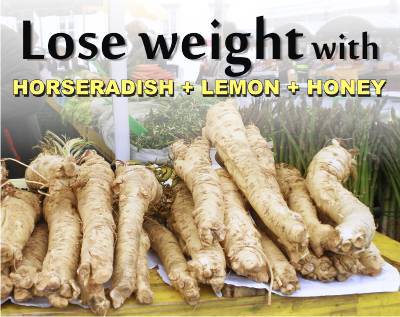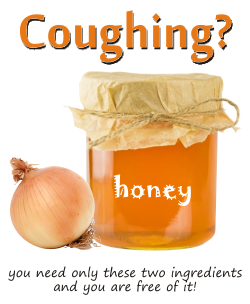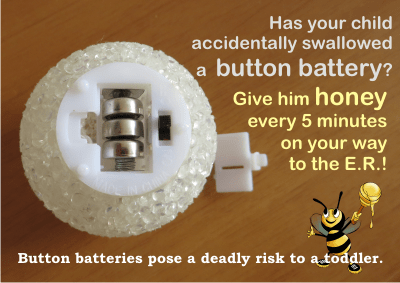Can manuka honey treat sinus infections? Are there some other natural alternatives?
In winter we deal with a very annoying problem. Well, besides colds. Sinus infection. And we have to face the same problem: conventional drugs have side-effects and create addiction. Honey can help and so can some plants. As a good antimicrobial, manuka honey is considered to be effective when used in irrigations.
But how many of these are mere folk claims or facts supported by science? We’ll see here.
Important steps to follow when having sinusitis:
1. Drink plenty of fluids such as water and herbal teas. Hot teas are the best because warm water can be better assimilated into your body. Avoid caffeine and coke as they can dehydrate your body. Don’t overdo it, studies have recently showed that a large quantity of water may be harmful, especially for those suffering of kidney diseases. Too much water can deplete the organism of sodium, so don’t drink 6 liters of water per day. Stick to 3.
2. Avoid foods that are known to be mucus-making, such as red meat, milk and all dairy products, flour products, eggs (especially the white), sugars (but yes, honey is allowed), salt.
3. Eat mucus-reducing foods such as: pumpkin seeds, ginger teas, honey, garlic, onion (remember my remedy for reducing cough with honey and onion?), grapefruit, pineapple, cayenne pepper, chamomile tea (drink a hot chamomile tea with the juice of a lemon), agar, horseradish, Elderberry (Sambucus Nigra), juices from raw fruits and vegetables.
3. Do steams and nasal rinses; they can help reduce pain and increase drainage. Consider sleeping with your head elevated to help your sinuses drain and provide relief from sinus pain.
4. When coughing, try expectorating out the mucus, rather than swallowing it.
Natural remedies for sinusitis
There are lots of them, but here are the most common ones:
1. The ACV remedy
it’s a tonic that can quickly break up congestion, kill pathogens and decrease mucous production.It is very beneficial for a common cold with runny nose. Take it 2 or 3 times per day.
Ingredients:
○ 1 tbsp apple cider vinegar
○ 1 1/2 cups warm water
○ A teaspoon of raw honey
2. Horseradish
Horseradish Spread does a wonderful job of clearing congested sinus passages.
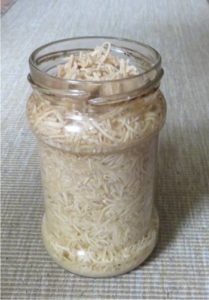 Recipe no. 1
Recipe no. 1
○ 1 tablespoon of freshly grated horseradish
○ 1 teaspoon of freshly squeezed lemon juice.
○ 1 teaspoon of virgin olive oil
Mix them well and then spread them on some crackers for quick sinus drainage.
Recipe no. 2
○ 4 to 5 horseradish roots
○ apple cider vinegar to cover it.
Grate the horseradish and place it in a glass jar. Pour apple cider vinegar over it to cover it. Put the lid on and leave the jar for 7 days. After that, take the jar, open the lid and inhale that smell. You will feel its effects immediately. Do it when you feel you need it, or 4 to 5 times per day.
You don’t need to refrigerate the jar. Horseradish is a very good preservative, used a lot in the food industry.
Is manuka honey effective in treating sinusitis, especially chronic sinusitis?
Yes, if the sinusitis is caused or maintained by a microbe.
Manuka honey proved to be more efficient than single antibiotics against biofilms of Pseudomonas aeruginosa and Staphylococcus aureus.
In vitro the effect of manuka honey against biofilms produced by Pseudomonas aeruginosa (PA) and Staphylococcus aureus (SA) was significantly higher (P<0.001) than that seen with single antibiotics commonly used against SA. (study)
The effect of sidr honey, was pretty much similar to that of manuka’s. (read this article to see the effect of both manuka and sidr honeys on these bacteria).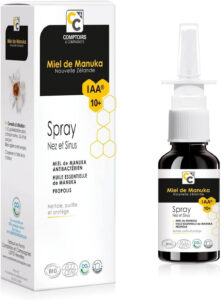
Manuka Honey IAA10+ Sinus And Nasal Spray, available on Amazon.co.uk picture source Amazon
Is manuka honey safe for our mucosa?
This study shows that “the application of a manuka honey solution (1.5-mL manuka honey solution) to rabbit nasal respiratory mucosa over different treatment intervals did not show evidence of histological epithelial injury.”
Another study (an animal study) also showed that sinus irrigations with manuka honey containing MGO in concentrations between 0.9 and 1.8 mg/mL is both safe to mucosa and efficacious against S. aureus biofilm. Which is why, this study recommends irrigation with manuka honey as a viable treatment option for recalcitrant chronic rhinosinusitis.
In a clinical trial, forty-eight patients with chronic rhinosinusitis undergoing bilateral functional endoscopic sinus surgery were enrolled in a prospective study. Patients were randomized and blinded to receive a medication-soaked Merocel MMS (either one of budesonide, gentamicin, or manuka honey) in one nostril and a nonmedicated Merocel MMS on the contralateral side.
7 days after surgery, the patients who received budesonide-soaked Merocel MMS showed a trend toward reduced mucosal inflammation, those who received gentamicin felt the same degree of discomfort and pain on the removal of the packings as those nonmedicated, and those receiving manuka honey-soaked Merocel MMS reported less pain.
Conclusion?
No significant benefit from the addition of manuka honey to the Merocel MMS.
What does conventional medicine say about the use of alternative therapies?
An evidence-based review from 2013 concludes that there is still insufficient clinical research to provide recommendations for alternative therapies using irrigations. The only clear thing is that by now the evidence recommends against the use of topical antifungal therapy and topical antibiotic therapy delivered using nebulized and spray techniques, in routine cases of chronic rhinosinusitis.
Yet, the alternative therapies of these days, as well as of all times, say that
Honey is a natural, nontoxic and inexpensive product that can help treat sinusitis.
Other natural methods of fighting sinusitis:
Oregano oil – it alleviates sinus infections (and colds) if you put a few drops of oregano oil in a pot of steaming water, and then inhale the steam.
SinuSoothe™ – 100% Natural Nasal Spray (SINUS & HEADACHE FORMULA)(0.68floz) – Sinusitis, Hay Fever, Sinus Allergies, Colds, Rhinitis, Nasal Spray Addiction
It is a great alternative to capsaicin-based nasal sprays. It can be used occasionally or daily for chronic conditions, has no known side effects, is non-addictive and has no known drug interactions. The ingredients of SinuSoothe have been used in traditional herbal medicine for hundreds of years. Among them: manuka oil, Australian tea tree oil, cajeput oil, niaouli oil, eucalyptus oil, turmeric, melaleuca oil and others.
And, let’s not forget the easy-to-make drenage that we can make it ourselves. A kind of massage combined with pressopuncture. Here is an explanatory video:
If you don’t know if you have sinusitis or not, here is a short review of the most important things you should know about sinusitis:
What is sinusitis?
A sinus infection that causes inflammation of the nasal cavities and sinuses. It can be triggered by colds, allergies, microorganisms and exposure to some chemicals. They all can cause swelling and inflammation in the lining of the sinus passages and block sinus drainage.
Acute sinusitis usually clears up within 3 weeks without treatment, or within 1 to 2 weeks with treatment.
Chronic sinusitis lasts 3 to 8 weeks or longer.
What are the symptoms?
Pain and pressure are the primary symptoms of a sinus infection. Then there is the difficulty of breathing.
Then there are other symptoms such as:
– pain or puffiness around the eyes;
– a bad-smelling, yellow-green discharge from the nose;
– bad breath;
– headache in the morning;
– aching in the upper jaw and the back teeth;
– weakness or extreme tiredness;
– coughing, especially at night.
People with sinusitis may also have earache, neck pain, or a sore throat caused by mucus draining into the throat.
You may have caught sinusitis if a cold lasts for more than 10 days or if you recognize the above symptoms. The only analyses to tell for sure if the sinuses are inflamed are X-rays and CT (computerized tomography). Generally, if these symptoms are present, there really isn’t a need for toxic exposure in your body. (see Is it true that X-Rays give us cancer in 20 years? How can we protect ourselves from radiation?)
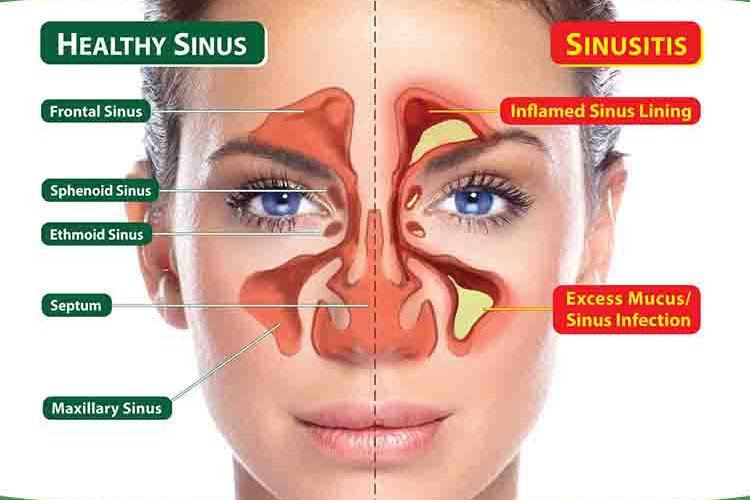 picture source: collective-evolution.com
picture source: collective-evolution.com
Is sinusitis contagious?
It may be. Sinusitis can be caused by an infection produced by a virus, bacteria or a fungus. All of them can cause all sorts of respiratory infections, from colds to pneumonia. If you take one of these microorganisms (e.g. Pseudomonas aeruginosa, Staphylococcus aureus, Streptococcus pneumoniae) from somebody, via drops of fluid from the nose or mouth, then you can get sinusitis. People can cough, sneeze, laugh, or talk and can transmit germs to their hands, to the surfaces around them and into the air.
Who can get sinusitis?
– People with allergies, asthma, and cystic fibrosis are more likely to have sinus infections.
– People with a weakened immune system, such as those who have AIDS or cancer;
– People with narrow sinus passages or with growths or blockages in the nasal area, such as tumors or polyps. Polyps are growths usually on the lining or surface of a body part, such as the nose or intestine. Their size can range from tiny to large enough to cause pain or obstruction.
– People with specific diseases like cystic fibrosis, because it causes the body to produce thick mucus that clogs passages in many of the body’s organs, including the lungs.
– People with previously broken or deformed nasal bones.
– People who swim or dive, because of the pressure this activity puts on the sinus cavities.
Other references:
http://www.humanillnesses.com/Infectious-Diseases-My-Si/Sinusitis.html
theheartysoul.com
Free Pictures from https://pixabay.com

